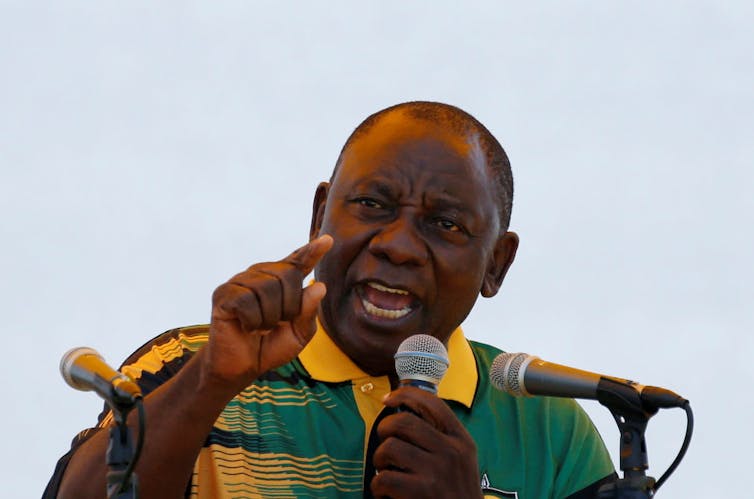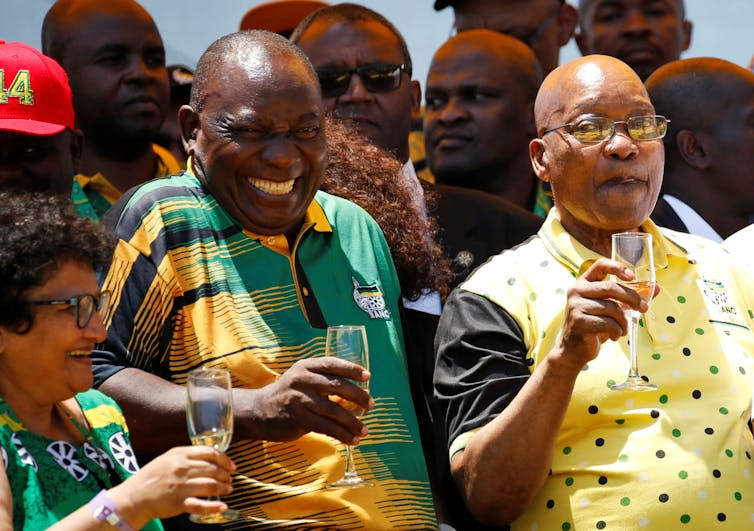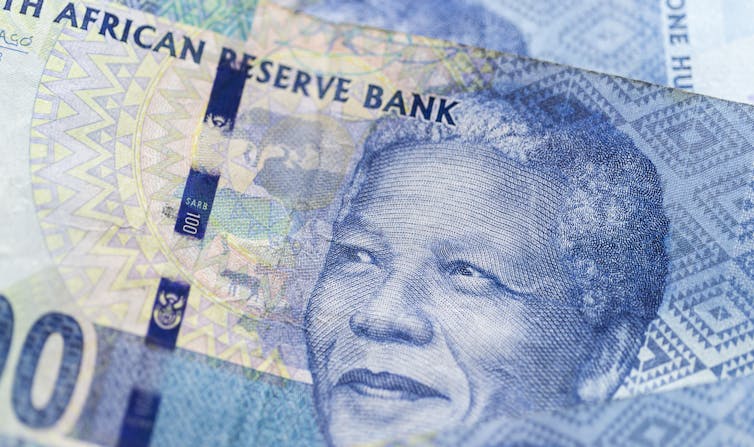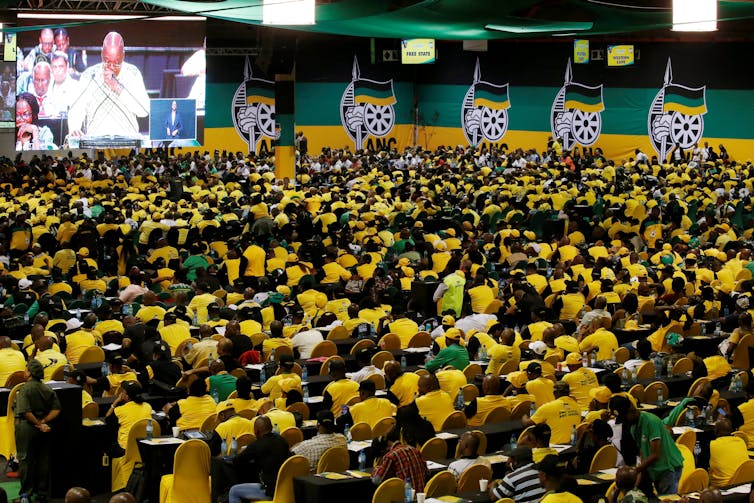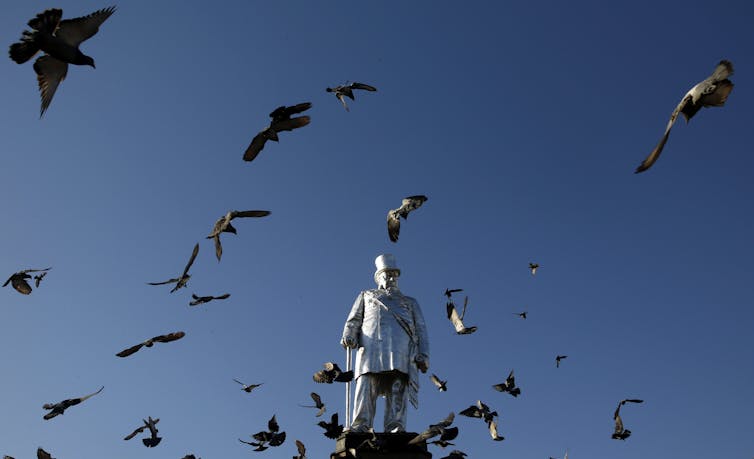
Statues like these - here Paul Kruger at Pretoria’s Church Square - are a reminder of a time when Afrikaners were the ruling class in South Africa.
Mike Hutchings/Reuters
Why is it that when the West was turning away from direct colonialism in the mid-20th century, South Africa shifted to apartheid, an intensified form of this heinous system?
One of the answers lies in the country’s history of colonisation by two contending settler classes. The Dutch, or Boer, settler class on the southern most point of Africa was displaced in the 19th century by the arrival of the British. The Afrikaners – as the descendants of the Boer settlers eventually became known – constructed their identity in opposition to, on the one hand, black identities, and on the other to Anglo whiteness.
The reverberations of the contest between these two settler groups continue even after apartheid, as I argue in my new book Sitting Pretty – White Afrikaans Women in Postapartheid South Africa.
During apartheid a great deal of work went into justifying the imposition of inequalities on the basis of human differences. In the end apartheid collapsed due to global opprobrium that was heaped on the Afrikaner government, with both material and symbolic consequences. It tipped Afrikaner identity into turmoil, not least because their sense of themselves as moral beings was radically challenged.
At stake was ordentlikheid, analysed in my book as an ethnicised respectability. Ordentlikheid is an Afrikaans word that is difficult to translate: apart from respectability, its meanings include presentability, good manners, decency, politeness and humility with a Calvinist tenor.
Today it works as a glue that holds the identity together at the intersections of specific versions of gender, sexuality, class and race. Ordentlikheid serves as a mode of identification that works as a panacea to Afrikaner woes as they struggle to cleanse themselves of the stain of apartheid and adapt to changing historical conditions.
Examining “Afrikaner” identity through the lens of ordentlikheid reveals it as a lesser whiteness in relation to white English-speaking South African identity, which in turn draws on global Anglo whiteness. Unpicking ordentlikheid reveals a double movement: ordentlikheid derives from and elaborates on white English-speaking respectability. But it is also, paradoxically, what sets Afrikaner whiteness apart from white English-speaking identity.
Slow-witted, simple, ignorant
These dynamics can be traced historically. By the late 1800s, the Boers were regarded as “an inferior or degraded class of colonist”, as historian Timothy Keegan writes. They were depicted by European visitors as indolent, slow-witted, simple, ignorant and even dirty.
Lord Kitchener concluded that the Boers were,
uncivilised Afrikaner savages with a thin white veneer.
As late as 1975, negative stereotypes about Afrikaners still abounded, for example in an essay written by priest and politics academic Nancy Charton. She summarises the “empirical evidence” of white English-speaking attitudes to “the Afrikaner”, listing positive stereotypes such as Afrikaners being simple and warm, and negative ones such as them being uncultured, superstitious and lacking in efficiency.
Pejorative terms for Afrikaners included “Dutchman”, “hairyback”, “rock spider”, “mealie muncher”, “takhaar” (long hair), “bywoner” (backyard dweller), “backvelder” and “plank”. These mocking terms show “the element of cultural and social superiority” of white English-speaking identity that Charton speaks approvingly of.
Afrikaner whiteness resisted white English-speaking domination. Afrikaners defied being subjected to the hegemonic white English-speaking culture through a counteracting discourse of Afrikaner “volkstrots” (people’s pride), noble suffering and Calvinist decency. Afrikaner nationalist histories written in the 1960s overhauled and relaunched Afrikaners as hospitable, brave and fair Christians.
An eighteenth century discourse of Boers-as-unspoilt-children-of-nature was recuperated as one of Afrikaner innocence, uncorrupted mentality and closeness to God.
My research shows that the competitive dynamic with white English-speaking identity persists even after the fall of official apartheid but with paradoxical manifestations. One example is that conceding to Anglo culture serves to elevate Afrikaner whiteness.
“That makes me angry”
White Afrikaans identity hovers between two poles symbolised by the Afrikaans language.
It’s premised on Afrikaans as the touchstone of Afrikaner nationalism. Yet, Afrikaans contains traces of its historical “association of being the language of the underprivileged”, as political scientist Louise Vincent writes.
Surprisingly, Afrikaans speakers abandon the language in certain social settings, even though it’s an intrinsic part of their identity.
To understand this complex relationship I interviewed a number of Afrikaner women in Johannesburg and Cape Town. One said that she was aware that she switched to English even when she was in the company of Afrikaans speaking people.
Leah (49) says:
When I look at Johannesburg where we live [an affluent, multiracial, centrally located suburb], 70% of the people [can] speak Afrikaans, but we all speak English.
Sandra (43) expresses her frustration:
I just get angry when people knowingly in a group [speak English when most are Afrikaans].
Pieta says:
I will speak to someone on the telephone and they will start in English and at some stage I’ll hear the person is Afrikaans and then I’d feel too bad switching to Afrikaans because I’m afraid they’ll think they speak bad English.
Nerina agrees:
That happens to me on a daily basis.
Respondents describe switching to English as part of a routine which is also experienced as a denial of white Afrikaans identity – and therefore as an injury. Social space is ceded to white English-speaking identity. Interestingly, however, this loss allows for the appropriation of an element of English whiteness: politeness.
The temporary abandonment of Afrikaans is covered over with an articulation of Afrikaans-ness with “politeness” and “accommodation”. It is resonant of “manners” as a key element of “Britishness”.
As Willemien (33) explains:
It is the effort we make with other people, not so? Yes, we are now going to speak English to you because you are English.
Pieta replies:
Because it is polite to do that.
In yielding to Anglo culture as a sign of “manners”, politeness becomes ordentlikheid. This manoeuvre shows that white Afrikaans-speakers remain trapped in a form of whiteness that competes with norm-setting white English-speaking whiteness, instead of seeking to transcend whiteness, and therefore race and racism, altogether.
Christi van der Westhuizen, Associate Professor, Sociology, University of Pretoria
Read the original article.
